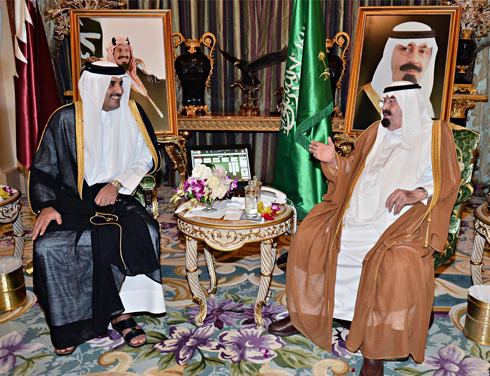Author(s): Yoel Guzansky
Source: ynetnews.com. Article date: December 26th, 2014
Source: ynetnews.com. Article date: December 26th, 2014
Many believed that Operation Protective Edge presented Israel with an opportunity to strengthen its ties with the Sunni-royalist bloc in the region, which, like Jerusalem, is not only interested in containing Iran but also seeks to weaken the regional powers (state and non-state actors) affiliated with radical Islam. One should keep in mind, however, that this sharing of interests did not begin today and is anchored in historical diplomatic developments.
With the release of the Fahd Initiative in 1982, Saudi Arabia abandoned, publicly at least, its policy that until then had rejected Israel's right to exist.
In the wake of the Madrid Conference (1991), ties between the two sides strengthened somewhat and together they set up five working groups to tackle various regional issues – water, the environment, economics, refugees and arms control.
The so-called Abdullah Initiative, which after the Beirut Summit in 2002 became the Arab Peace Initiative, went a step further and promised Israel “normal relations”with the Arab and Muslim world, subject to an Israeli withdrawal to the lines of June 4, 1967, and a resolution of the Palestinian refugee problem in keeping with UN Resolution 194.

Operation Protective Edge opened up a new diplomatic opportunity (Photo: EPA)
Israel failed to use the initiative as a basis for dialogue with the Arab world. While some senior Israeli officials – particularly Foreign Minister Avigdor Lieberman – have indeed expressed some support for a comprehensive regional settlement in the spirit of the Arab Initiative, Prime Minister Benjamin Netanyahu rejected it publicly just recently.

Operation Protective Edge opened up a new diplomatic opportunity (Photo: EPA)
Israel failed to use the initiative as a basis for dialogue with the Arab world. While some senior Israeli officials – particularly Foreign Minister Avigdor Lieberman – have indeed expressed some support for a comprehensive regional settlement in the spirit of the Arab Initiative, Prime Minister Benjamin Netanyahu rejected it publicly just recently.
Setting aside the Abdullah Initiative, the Saudis, too, have remained largely passive and shown little interest in promoting the idea of a regional peace agreement. This may be evidence that the initiative was designed from the outset to affect a change in the kingdom's negative image in the wake of the September 11, 2001, terror attacks in the United States.
Nevertheless, Oman and Qatar, whether it was to find favor in the eyes of the Americans or to anger the Saudis, established official relations, albeit partial ones, with Israel. Israel opened missions in both countries, but the second intifada and Operation Cast Lead led to their closure.
Israeli firms providing military aid to Guld countries
Israeli firms providing military aid to Guld countries
The Arab Gulf states have refused in recent years to openly adopt “confidence-building measures” towards Israel as part of an effort to drum up regional support for the peace process between Israel and the Palestinians. However, documents published on the WikiLeaks site speak of a “secret and persistent dialogue” on the Iranian issue.
It was reported, too, that Israeli companies are assisting states in the Gulf through security consulting, training of local military forces and the sale of weapons and sophisticated systems and technologies.
At the same time, senior officials from both sides are conducting ongoing meetings in and outside the region.
The reports also indicate that Israel has softened its policy on weapons exports to states in the Gulf as well as its attempts to restrict sales by the United States of advanced weapons to the Gulf countries, in part as a signal that it sees a potential for partnership more than it sees a possible threat. In addition, Israel is enjoying a certain amount of access to markets in the Gulf, as long as the products do not have Israeli labels.
Saudi Arabia and the Gulf states recognize Israel’s military power as well as its close ties with the United States (and its sway in Congress), and they see value in maintaining some level of coordination with Jerusalem. However, the “normal relations” (the Saudis’ preferred phrase) are not possible, these countries claim, as long as there is no significant breakthrough in the political process with the Palestinians.
Convergence of interests on the Iran issue
From the perspective of the Gulf states, the cost of open relations with Israel at this point in time may be higher than the benefit. They are currently benefiting from the fact that the covert, unofficial relations are allowing them to enjoy the advantages of ties with Israel without having to pay a price in Arab public opinion. Any attempt therefore to publicize the relations could end up undermining them instead.
Only real progress in the peace process between Israel and the Palestinians can expand the common ground and require the Gulf states to back the entire agreement – from a political, religious and economic point of view.

Emir of Qatar Tamim bin Hamad Al Thani and Saudi King Abdullah
(Photo: Reuters)

Emir of Qatar Tamim bin Hamad Al Thani and Saudi King Abdullah
(Photo: Reuters)
Moreover, the fact that Iran is perceived as a common threat may not necessarily make it easier for the Gulf states and Israel to cooperate. Shared interests do not mean a shared view of the strategic environment.
Thus, for example, the Gulf states may indeed be hoping for an Israeli strike against Iran’s nuclear infrastructures, but they have reservations about appearing to be cooperating with Israel, lest they be required to pay the price for an Israeli assault.
Furthermore, a future agreement between the world powers and Iran on the nuclear issue, and their fear of such an agreement, could lead the Gulf states, for want of a better option, to move closer to Iran in a measured fashion and become more vocal about Israel's nuclear activities – along the lines of: “If Iran, then why not Israel?”
Despite the aforesaid, one shouldn’t underestimate the importance of the relations, especially since these are ties between states that do not officially recognize each other. Dialogue between the parties helps to maintain regional stability and certainly can't do any harm to promoting a political settlement.
Saudi Arabia: Arab Peace Initiative still 'on the table'
Saudi Arabia: Arab Peace Initiative still 'on the table'
In addition, the Saudis have been signaling of late that the Arab Peace Initiative is still “on the table,” that it's a basis for negotiations and not a dictate, and that it can be adjusted to suit the changing regional reality.
Along with these positive statements, senior Saudi officials are no longer shying away completely from public meetings with Israeli officials; and recently we witnessed a meeting between former Saudi intelligence chief Prince Turki Al Faisal and Major General (res.) Amos Yadlin, head of the Institute for National Security Studies, with yours truly in attendance for some of the time too.
Following Operation Protective Edge, the Gulf states appeared to be trying again, on a declarative level at least, to revive the Arab Peace Initiative and present it to Israel as the best solution to the conflict.
“The good news,” wrote Mamoun Fandy in the Saudi-owned pan-Arab daily Asharq Al-Awsat, “is that if Israel wants to achieve a great deal with the Arabs, now is the time to do it.”
According to Fandy, “The Arab countries are in their worst political state in years; and because of the internal political upheavals they are experiencing, they are now ready to sign a comprehensive deal with Israel.”
Some may argue that the current weak state of the Arab countries is cause for Israel to refrain from making any agreements with them at this time, as the partners to such agreements would struggle to uphold them. However, between a comprehensive regional political settlement and no cooperation at all there is considerable room in which to work, and Israel can take advantage of this.
Yoel Guzansky is a senior researcher at Tel Aviv University's Institute for National Security Studies.
No comments:
Post a Comment
Thanks for commenting. Your comments are needed for helping to improve the discussion.